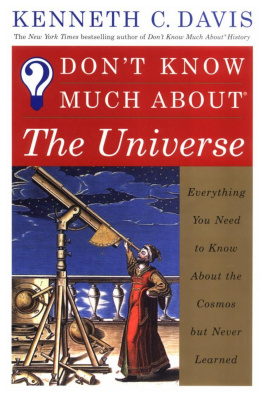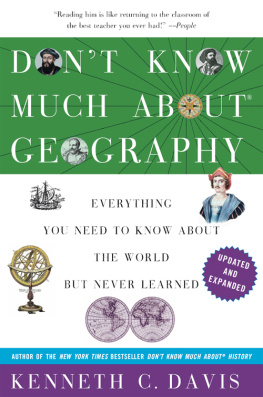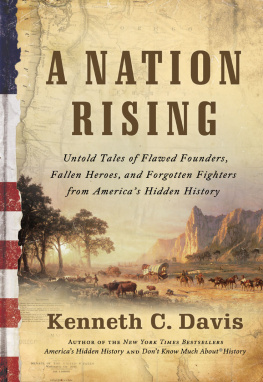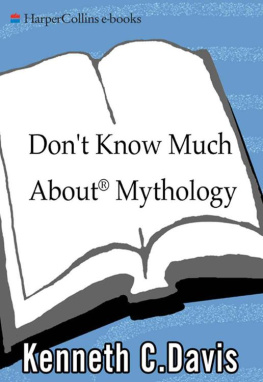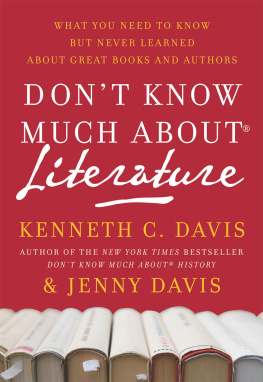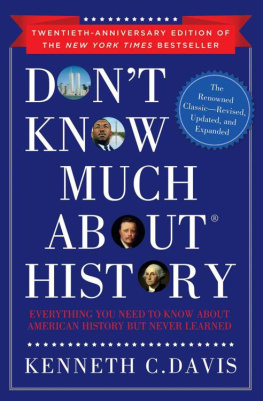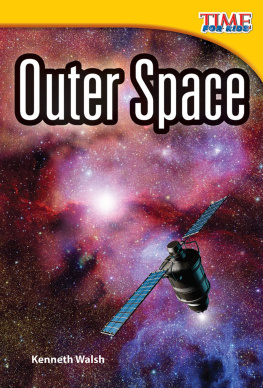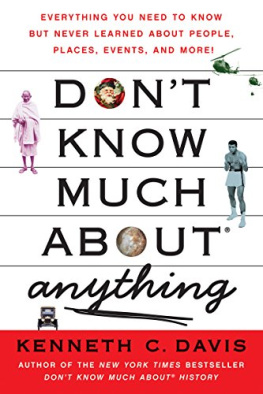Kenneth C. Davis - Don’t Know Much About® the Universe
Here you can read online Kenneth C. Davis - Don’t Know Much About® the Universe full text of the book (entire story) in english for free. Download pdf and epub, get meaning, cover and reviews about this ebook. genre: Science fiction. Description of the work, (preface) as well as reviews are available. Best literature library LitArk.com created for fans of good reading and offers a wide selection of genres:
Romance novel
Science fiction
Adventure
Detective
Science
History
Home and family
Prose
Art
Politics
Computer
Non-fiction
Religion
Business
Children
Humor
Choose a favorite category and find really read worthwhile books. Enjoy immersion in the world of imagination, feel the emotions of the characters or learn something new for yourself, make an fascinating discovery.
- Book:Don’t Know Much About® the Universe
- Author:
- Genre:
- Rating:4 / 5
- Favourites:Add to favourites
- Your mark:
- 80
- 1
- 2
- 3
- 4
- 5
Don’t Know Much About® the Universe: summary, description and annotation
We offer to read an annotation, description, summary or preface (depends on what the author of the book "Don’t Know Much About® the Universe" wrote himself). If you haven't found the necessary information about the book — write in the comments, we will try to find it.
Don’t Know Much About® the Universe — read online for free the complete book (whole text) full work
Below is the text of the book, divided by pages. System saving the place of the last page read, allows you to conveniently read the book "Don’t Know Much About® the Universe" online for free, without having to search again every time where you left off. Put a bookmark, and you can go to the page where you finished reading at any time.
Font size:
Interval:
Bookmark:

 D O N T K N O W MUCH ABOUT The Universe Dont Know Much About the Universe EVERYTHING YO U N E E D T O K N O W A BO U T O U T E R S PAC E BUT NEVER LEARNED K E N N E T H C . D A V I SFor Star Gibbs,who gave me my first rocketThe Way of Heaven has no favorites.It is always with the good man. Lao-Tzu When I consider thy heavens, the work of thy fingers, the moon and the stars, which thou has ordained; What is man, that thou art mindful of him? and the son of man, that thou visitest him? For thou hast made him a little lower than the angels. Psalms 8:2325 Astronomy compels the soul to look upwards and leads us from this world to another. PLATO, The Republic Space isnt remote at all. Its only an hours drive away if your car could go straight upwards. SIR FRED HOYLE, in the London Observer, 1979 C O N T E N T S Lost in Space vii The Great Ocean of Truth Across the Gulf Where No Man Has Gone Before To Boldly Go The Old Ones Secrets What Color Is Your Universe? 3 3 L O S T I N S P A C E When I was a teenager, I used to pose questions like this: Mom, can I borrow five bucks for a movie? Or, Mrs.
D O N T K N O W MUCH ABOUT The Universe Dont Know Much About the Universe EVERYTHING YO U N E E D T O K N O W A BO U T O U T E R S PAC E BUT NEVER LEARNED K E N N E T H C . D A V I SFor Star Gibbs,who gave me my first rocketThe Way of Heaven has no favorites.It is always with the good man. Lao-Tzu When I consider thy heavens, the work of thy fingers, the moon and the stars, which thou has ordained; What is man, that thou art mindful of him? and the son of man, that thou visitest him? For thou hast made him a little lower than the angels. Psalms 8:2325 Astronomy compels the soul to look upwards and leads us from this world to another. PLATO, The Republic Space isnt remote at all. Its only an hours drive away if your car could go straight upwards. SIR FRED HOYLE, in the London Observer, 1979 C O N T E N T S Lost in Space vii The Great Ocean of Truth Across the Gulf Where No Man Has Gone Before To Boldly Go The Old Ones Secrets What Color Is Your Universe? 3 3 L O S T I N S P A C E When I was a teenager, I used to pose questions like this: Mom, can I borrow five bucks for a movie? Or, Mrs.
Brown, can I get an extension on that term paper? Or, Will I ever get a date? When Albert Einstein was a teenager, he asked, What would the world look like if I rode on a beam of light? I dont know why Einsteins extraordinary query never occurred to me back in school. But thats why Einstein rewrote the laws of physics and, thirty years after my school days, his question still leaves me scratching my head. However, as I look back and think about it, I am struck by the fact that none of my science teachers ever asked it either. Long and tedious, the science classes I attended didnt inspire much curiosity about the laws of nature or the workings of the universe. For me, like many red-blooded American boys, science classes were less than compellingexcept for high-school Biology and the intense crush I had on my teacher. There she was, talking about zygotes, chromosomes, and fertiliza tion.
But the problem was that I could not take my eyes off her as she sat on the edge of her desk, legs crossed, a white lab coat covering her dress. As if that distraction wasnt bad enough for a fourteen-year-old, v iiiIntroduction I was not naturally selected as a science student. In other words, while I managed to squeak through a year of freshman biology, it was a survival struggle of Darwinian proportions. Sadly, as I look back at the sum of my scientific education before high school, I realize that my early science classes were equally for gettable. From Anatomy to Zoology, all that I retain of those endlessly dry and deadly dull classroom hours are vague recollections of having to draw bad diagrams of oversized eyeballs and eardrums and being forced to memorize the Periodic Table of Elementsan exercise that now strikes me as a futile and fairly useless piece of information. The only excitement came when the teachers little experiments involving Bunsen burners went awry and produced an unexpected explosion and burst of smoke to the delight of the dozing students, eager for any sign of entertainment.
But even more remarkable than the high Boredom Quotient that I associate with science in my schooldays is the fact that I have no recollection of learning anything at all about space, astronomy, or the universe in my science classes. Apart from a single field trip to a traveling NASA display and our class trip to New York City to see 2001: ASpace Odyssey when it was all the rageand which none of the teachers could quite explain to usthere is a large black hole where my education about the universe is supposed to be. We were all, as the popular television show of my childhood put it, lost in space. (Danger, Will Robinson!) What makes this severe shortcoming all the more noteworthy is the fact that my early education came during the most remarkable era in the history of space exploration. I was born in 1954, three years before the Soviet Union launched Sputnikthe basketball-sized satel lite that changed American education and started the Space Race. These were NASAs glory daysthe era of Life magazine covers elevating John Glenn and the other astronauts to the celebrity pedestal now generally reserved for teenaged rock singers, talk-show hosts, and television sitcom stars.
With Walter Cronkite as cheerleader in chief, that national joyride in space climaxed with the Apollo Moon missions of the late sixties and early seventies, which captured the worlds attention and imagination. I clearly recall the overwhelming public enthusiasm about space as our family stayed up late to watch Introductionxi lift-offs and Moon landings, proudly fulfilling President John F. Kennedys challenge to put a man on the Moon. What an unbeliev able rush of pride and near disbelief as we watched those grainy tele vision images on July 20, 1969, from a quarter of a million miles away, as astronaut Neil Armstrong bounded down the last step of the lunar lander, Eagle, and told the waiting world, Thats one small step for [a] man, one giant leap for mankind. But, inexplicably, that national excitement never translated into our classrooms. Bound by curriculum requirements and backbreaking but deadly dull textbooks, my teachers seemingly ignored the world outside our classrooms.
In spite of the billions of dollars being spent on space exploration, the obvious fascination with outer space that made Star Trek the show we all watched, and basic human curiosity about the unknown, learning about the universe never made it into the lesson plans. Even the obligatory field trips to the American Museum of Natural History in New York City managed to bypass the adjoining Hayden planetarium. And by the 1970s, when the planetarium got hip enough to run its Skyshows at midnight with Pink Floyd music play ing, my attention was not exactly focused on sorting out the difference between the Big Dipper and the Little Dipperwhich, I learned later to my dismay, were not even constellations but smaller star figures in the sky called asterisms. Obviously, like millions of other Americans, I didnt know much about space. The cosmos remained the exclusive preserve of the guysand they were all guys back thenin white lab coats who knew exactly what a slide rule is for. This is a sad commentary on my schooling and education in gen eral, because I am certain I am not alone. As with the other subjects I have covered in the Dont Know Much About series, the areas of space and astronomy hold considerable fascination for many people who have a basic curiosity about the universe.
But, as a nation, we are Astronomically Ignorant in every sense of the expression. Textbooks, written by one set of professors and academics to be read by other professors and academics, left us miserable and muddled. Miseducation, media confusion, and Hollywood myth-making have all played signif icant roles in creating this knowledge gap. And this celestial short coming is all the more remarkable because the fascinating story of xIntroduction outer space and the universe is not just about physics and rockets and payloads. Basically, it is a human story. After all, science started when people looked at the Sun, Moon, and stars and began to ask questions.
Where did the Sun go each night and why did it return each morning? Why did the stars move so predictably across the sky? Why did the Moon move across the sky in such a regular way? What did the Moon and the tides have to do with each other? And what did
Next pageFont size:
Interval:
Bookmark:
Similar books «Don’t Know Much About® the Universe»
Look at similar books to Don’t Know Much About® the Universe. We have selected literature similar in name and meaning in the hope of providing readers with more options to find new, interesting, not yet read works.
Discussion, reviews of the book Don’t Know Much About® the Universe and just readers' own opinions. Leave your comments, write what you think about the work, its meaning or the main characters. Specify what exactly you liked and what you didn't like, and why you think so.

